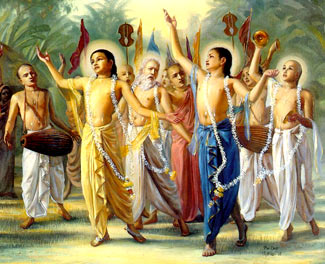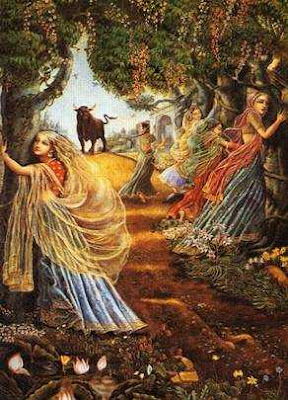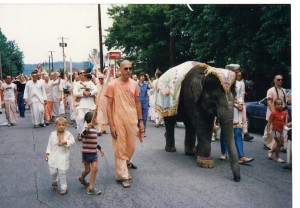Tuesday, March 11th, 2014
Tapping our irreducible individuality in bhakti-yoga
→ The Spiritual Scientist
March 13th, 2014 – Darshan
→ Mayapur.com
The post March 13th, 2014 – Darshan appeared first on Mayapur.com.
Conversation with devotees in Mayapura
→ SivaramaSwami.com
The post Conversation with devotees in Mayapura appeared first on SivaramaSwami.com.
Harinam at Santa Rosa, Pasig and San Pablo, Philippines, with Giridhari Swami (Album 104 photos)
→ Dandavats.com
 All Glories to the Harinam Sankirtan of Lord Sri Chaitanya Mahaprabhu. Harinam is the congregational street chanting of the holy names of Krishna or God, if anyone is interested in performing the Yuga Dharma Harinam Sankirtan, is cordially invited to join with us and assist in this effort to please His Divine Grace Srila Prabhupada. Your cooperation in any way will please the Lord as this was the desire of Lord Sri Chaitanya Mahaprabhu to spread his name in every town and village.
Harinam Sankirtan ki!!! Jaya!!! Read more ›
All Glories to the Harinam Sankirtan of Lord Sri Chaitanya Mahaprabhu. Harinam is the congregational street chanting of the holy names of Krishna or God, if anyone is interested in performing the Yuga Dharma Harinam Sankirtan, is cordially invited to join with us and assist in this effort to please His Divine Grace Srila Prabhupada. Your cooperation in any way will please the Lord as this was the desire of Lord Sri Chaitanya Mahaprabhu to spread his name in every town and village.
Harinam Sankirtan ki!!! Jaya!!! Read more › Golden 6-Hour Kirtan – This Saturday!
→ The Toronto Hare Krishna Temple!
 As you may already know, we are celebrating quite the festival this Golden Weekend and it all starts off with a non-stop 6-Hour Kirtan on Saturday, March 15, 2014! The kirtan will kick off right at 3:00pm and end with a grand finale at 9:00pm, including prasadam (vegetarian feast).
As you may already know, we are celebrating quite the festival this Golden Weekend and it all starts off with a non-stop 6-Hour Kirtan on Saturday, March 15, 2014! The kirtan will kick off right at 3:00pm and end with a grand finale at 9:00pm, including prasadam (vegetarian feast).Please come and join us as we begin to celebrate the appearance of Lord Chaitanya this weekend!
Schedule (subject to change):
3:00pm - 3:30pm: Mayapurchandra das
3:30pm - 4:00pm: Kunti
4:00pm - 4:45pm: Radha Murari Kirtan Band
4:45pm - 5:00pm: Gopinath Kids Camp Children
5:00pm - 5:30pm: Darshan
5:30pm - 6:00pm: Nipun
6:00pm - 6:30pm: Hitesh
6:30pm - 7:15pm: Sukhayanti devi dasi
7:15pm - 8:00pm: Radha-mohan das
8:00pm - 9:00pm: Dhira Grahi das
Aditi Dukhana Prabhu at Kirtan Mela Mayapur 2014 Day 3
→ Gouranga TV - The Hare Krishna video collection
Aditi Dukhana Prabhu at Kirtan Mela Mayapur 2014 Day 3
New Vrindaban’s Transcendental Throwback Thursday – 03/13/14
→ New Vrindaban Brijabasi Spirit
New Vrindaban’s Transcendental Throwback Thursday – 03/13/14.
Each week we highlight an earlier era of ISKCON New Vrindaban.
This week’s challenge: In the photo, there are approximately 20 devotees whose faces are recognizable. How many can you identify?
Extra Credit: What are the names of the elephant and her caretaker?
Post your guesses on the “who, what, when & where” in the comment section at the New Vrindaban Facebook Page.
Technical stuff: We share the photo Thursday and confirm known details Sunday. Let’s keep it light and have a bit of fun!
Special request: If you have a photo showing New Vrindaban devotees in action, share it with us and we’ll use it in a future posting.
HG Maha Hari Prabhu – Reading from Sri Caitanya Caritamrta
→ Kalachandji's Audio Archive
HG Narottamananda Prabhu / SB 10.57.31
→ Kalachandji's Audio Archive
Villa Vrindavana Adds Color and Music to Italy’s Summer
→ ISKCON News
Where Does the Source of Bliss Find Bliss?
→ The Enquirer
The opening verse of Śrī Govinda Līlāmṛta is exquisite
śrī govindaṁ vrajānandaṁ sandohahānanda mandiram.
vande vṛndāvanānandaṁ śrī-rādha-saṅganānanditam.
Beautiful Govinda,
- Vraja Kishor
Bhajans 3:00 PM Gaura Paurnima
→ New Vrindaban Brijabasi Spirit
New Vrindaban Daily darsan @ March 12, 2014.
→ New Vrindaban Brijabasi Spirit
I have fallen into the blind well of household-life, and I am being devoured by the black snakes of lust and other faults. O abode of Vrndavana, when will you take me out of this well and acting as a mother, give me shelter on your lap?
[Source : Nectarean Glories of Sri Vrindavana-dhama by Srila Prabodhananda Sarasvati Thakura, 1-88 Translation.]
Meaning Of The Names PT.7
→ Japa Group

While in Gokula, Sri Hari (Krsna) killed the demon known as Aristasura. During that time, Radha cried out to Him with great feeling and by doing so, She stole His mind. She is thus known as Hara.
Ahimsa Foundation to Certify All ISKCON India Cow Protection Projects
→ ISKCON News
International Womens Day, food for all
→ simple thoughts
International Women’s Day 8th March 2014
This is an annual event we take part in every year. We are asked to distribute prasad in three locations in central London and organise a ladies Harinam party for the procession down Oxford street and ending in a rally in Trafalgar Square. Lalita Saki Dasi was our main preacher on the day. Everybody loves prasad and everyone needs liberating.
Then in the evening the Kirtan party again liberates one and all. The singer is Doya Dasi with her child Nadia.
)
A disciple of Swami Narayana said to Srila Prabhupada. “My spiritual master said to avoid women and never go where there are women”. Srila Prabhupada laughed and said ” that’s impossible,there are women everywhere”. Then coming back to the temple and watching two women devotees bow down to him, he said,” by associating with these women,you will be purified”.(Madhavanda)
Hitler for matajis from Food For All on Vimeo.
Feeding the Poor; Raising awareness
→ simple thoughts
Dear Devotees,
PamHo AgtSp,
Just keeping you up to date with our projects.
We had a busy weekend with the International Women’s Day event, then on Monday we had a fund raising gig with Pete Doherty in Camden Town, the video is of our devotee Jennie on stage:
)
Tuesday we had Tribhuvanth’s festival team holding a festival in Essex and this Thursday we are off to Ireland for a prasad distribution event called “feed the 5,000″.
Your servant
Parasuram Das
Many questions, one answer!
→ KKSBlog
(Kadamba Kanana Swami, 25 December 2013, Mayapur, India, Srimad Bhagavatam 5.9.3)
There are many ‘how to’ questions in Krsna consciousness, “How to be humble? How to be determined. How to keep a balance? How to do all these things?’”
 The only answer to that is to become independently thoughtful; Krsna consciousness is never just about blind following, “Maharaj, please give me an instruction that I can apply in all places and all times?’”
The only answer to that is to become independently thoughtful; Krsna consciousness is never just about blind following, “Maharaj, please give me an instruction that I can apply in all places and all times?’”
I can give you one, “Always chant Hare Krsna!” That is the only one I know and in all other matters, you have to take instructions and use the intelligence on how to apply it.
“Should we all become like Jada Bharata?” I think Mayapur will become total chaos if we were all to walk out of this class and start to act like Jada Bharata! Maybe, we take something of the spirit of Jada Bharata. So how to follow Jada Bharata? The answer is: with intelligence.
“How to follow instructions, of when to say yes and when to say no?” Judge every situation by itself. Analyze the situation and see if it is favourable for Krsna. If you are not sure, ask advice of somebody you trust and in that, way we stumble along in spiritual life:
‘durgame pathi me ’ndhasya
skhalat-pāda-gater muhuḥ
sva-kṛpā-yaṣṭi-dānena
santaḥ santv avalambanam,’ (CC Antya-lila 1.2)
My path is very difficult. My feet are slipping again and again but by the stick of the mercy of the devotees, I can stay on the path. So, when we are not sure ask someone for advise!
Home Again
→ travelingmonk.com
A severed hand may appear like a hand but it has no Potency
→ The Spiritual Scientist
Because we do not know that there is a complete arrangement in nature for our maintenance, we make efforts to utilize the resources of nature to create a so-called complete life of sense enjoyment. Because the living entity cannot enjoy the life of the senses without being dovetailed with the Complete Whole, the misleading life of sense enjoyment is illusion. The hand of a body is a complete unit only as long as it is attached to the complete body. When the hand is severed from the body, it may appear like a hand, but it actually has none of the potencies of a hand. Similarly, living beings are part and parcel of the Complete Whole, and if they are severed from the Complete Whole, the illusory representation of completeness cannot fully satisfy them.
- Srila Prabhupada, Sri Isopanishad > Iso Invocation
Three New Baby Calves Born at New Vrindaban Goshalla
→ New Vrindaban

Calves are very special living entities, and they have their own personalities, just like people do!
Last Friday, March 7, 2014, mother cow Anjali had a baby boy calf, who was named Amani. He was very strong right from birth, and there were absolutely no problems. He began nursing immediately and was quite sociable, after standing up and moving around the calf pen near his mother.
Then, on Monday March 10, mother cow Lakshmi had her own little baby boy calf, who hasn’t been named as of yet. Different than young Amani, Lakshmi’s young bull is shy and had to be shown how to drink milk from his mother.
Then another surprise! That night, Monday March 10, at 7:00 PM, bull #3 was born! After several failed attempts, he finally stood up. We think that because he is tall and lanky, with long legs, that it was harder for him to walk. But now he’s jumping around the goshalla calf pen, along with the other two baby bulls.
We wish the three new baby bulls and their matas all the best, for a great life serving Sri Sri Radha Vrindabanchandra. Hare Krsna!
A visit to the sacred home of Srila Bhaktivinode Thakur (Album 42 photos)
→ Dandavats.com
 Indradyumna Swami: Pictured here is the Temple of the Vedic Planatarium, under construction. Before entering Sridham Mayapura we visited the sacred home of Srila Bhaktivinode Thakur, from where he had a vision of a magnificent temple appearing one day in the future just across the Jalangi river. By Srila Prabhupada's strong desire that temple is now beginning to manifest as the Temple of the Vedic Planetarium. We also visited Nrsimha-pali, where Lord Nrsimha took bath on His way back to Vaikuntha, after killing the demon Hiranyakasipu. Purified of heart and in a mood of humility we finally arrived in ISKCON's Mayapura Candrodaya Mandir. Good to be home again! Read more ›
Indradyumna Swami: Pictured here is the Temple of the Vedic Planatarium, under construction. Before entering Sridham Mayapura we visited the sacred home of Srila Bhaktivinode Thakur, from where he had a vision of a magnificent temple appearing one day in the future just across the Jalangi river. By Srila Prabhupada's strong desire that temple is now beginning to manifest as the Temple of the Vedic Planetarium. We also visited Nrsimha-pali, where Lord Nrsimha took bath on His way back to Vaikuntha, after killing the demon Hiranyakasipu. Purified of heart and in a mood of humility we finally arrived in ISKCON's Mayapura Candrodaya Mandir. Good to be home again! Read more › sacrifice…is the key to happiness?
→ everyday gita
It's been awhile since I've written my last post and I'd like to extend my apologies to everydaygita's regular readers. Although it wasn't intentional, this break from writing has filled with me more experiences of seeing the Gita in action. That said, you would think that I would be bubbling over with words and that the greatest challenge I would be facing right now is to stop myself from writing a 10 page essay!
Instead, I'm finding it hard to shake off the cobwebs that form whenever I stop writing and quite confronting to stare at the blinking courser which seems to be taunting me to come up with the right words.
At this moment, I can totally relate with the subject of sacrifice!
Writing on the Gita always brings me a deep sense of satisfaction and happiness. As opposed to just reading some words, appreciating them for a few minutes and then forgetting about them, writing compels me to personalize and internalize the Gita's teachings. In short, it forces me to use my intelligence!
All of us discover new connections and experience new realizations frequently. But if you're anything like me, it's easy to forget them if they are not written down immediately. The process of capturing those feelings and emotions in an articulate manner leaves a lasting effect.
But to get there requires sacrifice. For me, it's the sacrifice of reading the Gita, introspecting on the meaning, praying for realizations, and setting aside time to journal them here.
It's a pretty simple yet apt analogy for illustrating how sacrifice is required to achieve happiness. For those who long for eternal happiness, the same formula holds true - it too requires sacrifice, and as the bhakti yoga texts explain, requires that we understand a couple of things:
1. The happiness that we experience when we are live in the mind-set of "I am this body" is temporary. There's nothing wrong with it, it's just not ever-lasting.
2. To experience ever-lasting happiness, we have to realize that we are the soul and not this body. That comes by associating with those persons who have already realized this (i.e. advanced bhakti yogis) and engaging in the practice of mantra meditation which helps us to re-connect with our souls.
3. Eternal happiness requires that we sacrifice temporary happiness. But just like writing, the process is not painful. It may a bit uncomfortable when we begin, but as it becomes more consistent, the process itself is blissful.
So whether you are looking for happiness in certain aspects of your life or are looking for the ultimate, everlasting kind, just remember one thing. The process of sacrificing may seem uncomfortable or even painful at first, but give it some time. You may be surprised to realize that sacrifice itself can be blissful.
10,000 devotees from 5 groups of parikrama. Amazing spiritual experience! (Album 124 photos)
→ Dandavats.com
 These are photos mainly from the parikrama of Russian bhaktas. Just watch their bliss! Read more ›
These are photos mainly from the parikrama of Russian bhaktas. Just watch their bliss! Read more › Festival in Colchester, University of Essex – 11 March 2014 (Album 35 photos)
→ Dandavats.com
 This was our first hall festival of the year and was very successful!
We planned for 150 people to come, but around 230+ guests came!
There were a few hiccups such as audio issues and the dancer being late from stuck in traffic!
The feast at the end was very delicious!
We apologise to those who could get seating but next time we will try to book the hall next door with 300 seats. Read more ›
This was our first hall festival of the year and was very successful!
We planned for 150 people to come, but around 230+ guests came!
There were a few hiccups such as audio issues and the dancer being late from stuck in traffic!
The feast at the end was very delicious!
We apologise to those who could get seating but next time we will try to book the hall next door with 300 seats. Read more › Vaishnava marriage in Iskcon Mayapur (Album 16 photos)
→ Dandavats.com
 Jahnava Sundari Devi Dasi and Tom Jawel at Iskcon Mayapur Read more ›
Jahnava Sundari Devi Dasi and Tom Jawel at Iskcon Mayapur Read more › Prabhupada Letters :: Anthology 2014-03-12 16:12:00 →
Prabhupada Letters :: 1968
Prabhupada Letters :: Anthology 2014-03-12 16:11:00 →
Prabhupada Letters :: 1968
Navadwip Mandala Parikrama Day 6 (Album 53 photos)
→ Dandavats.com
 Nabadwip and Nadia were great centres of learning and intellectual prowess. For five centuries, it was referred to as “Oxford of Bengal”. Read more ›
Nabadwip and Nadia were great centres of learning and intellectual prowess. For five centuries, it was referred to as “Oxford of Bengal”. Read more › Prabhupada Letters :: Anthology 2014-03-12 16:03:00 →
Prabhupada Letters :: 1968
Prabhupada Letters :: Anthology 2014-03-12 16:02:00 →
Prabhupada Letters :: 1970
Prabhupada Letters :: Anthology 2014-03-12 15:55:00 →
Prabhupada Letters :: 1970
Prabhupada Letters :: Anthology 2014-03-12 15:49:00 →
Prabhupada Letters :: 1972
Prabhupada Letters :: Anthology 2014-03-12 15:46:00 →
Prabhupada Letters :: 1972
Prabhupada Letters :: Anthology 2014-03-12 15:44:00 →
Prabhupada Letters :: 1975
Shantipur Festival Live Tomorrow
→ Mayapur.com
On 13th march there is a big festival held at shantipur a place near Mayapur which was the residence of Advaita Acharya. There will be a huge amount of cooking held and all devotees including Maharajas will serve Khichudi to the devotees and pilgrims. The pastime behind this festival is – A very auspicious festival […]
The post Shantipur Festival Live Tomorrow appeared first on Mayapur.com.
March 12th, 2014 – Darshan
→ Mayapur.com
The post March 12th, 2014 – Darshan appeared first on Mayapur.com.
Mayapur Class Transcriptions
→ Mayapur.com
Thankfully to the service of a few sincerely devotees we have transcriptions of some of the lectures given during the festival time here in Mayapur. Please check below for the list of recently added lectures. You can also visit the Lecture Transcription Archives for all past transcriptions. Srimad Bhagavatam 5.13.21 – HH Bhakti Asraya Vaisnava Swami Srimad […]
The post Mayapur Class Transcriptions appeared first on Mayapur.com.
Srimad Bhagavatam 5.13.21 – HH Bhakti Asraya Vaisnava Swami
→ Mayapur.com
(Kindly transcribed by Swetha Ganeshan Mataji) Download the audio for this lecture here: Download From: Sri Mayapur Chandrodaya Mandir! Date: March 10th, 2014 Speaker: HH Bhakti Asraya Vaisnava Swami Subject: S.B. 5.13.21 rajovaca aho nr-janmakhila-janma-sobhanam kim janmabhis tv aparair apy amusmin na yad dhrsikesa-yasah-krtatmanam mahatmanam vah pracurah samagamah TRANSLATION: King Rahugana said: This birth as […]
The post Srimad Bhagavatam 5.13.21 – HH Bhakti Asraya Vaisnava Swami appeared first on Mayapur.com.



